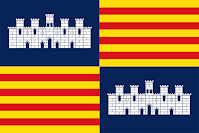Blog Real
Imperial Majesty
- Joined
- Jan 9, 2013
- Messages
- 12,602
- City
- Lisboa
- Country
- Portugal
Topic on the history and the origin of the Spanish monarchy.
Origen de la monarquía española - Opinión - Diario de León
https://www.casareal.es/ES/MonarquiaHistoria/Paginas/historia-monarquia.aspx
Anyone with more information and facts about the history and the origin of the Spanish monarchy can put the links in this topic.
The Spanish Crown has reigned in the five continents and passed from parents to children from 788.
La española es la Familia Real más antigua de Europa - ABC.es
Origen de la monarquía española - Opinión - Diario de León
https://www.casareal.es/ES/MonarquiaHistoria/Paginas/historia-monarquia.aspx
Anyone with more information and facts about the history and the origin of the Spanish monarchy can put the links in this topic.
The Spanish Crown has reigned in the five continents and passed from parents to children from 788.
La española es la Familia Real más antigua de Europa - ABC.es
Last edited by a moderator:



